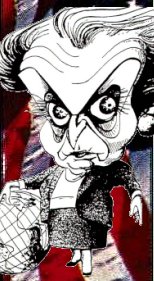|
|

Jewish World Review / May 25, 1998 / 29 Iyar, 5758
William Pfaff
PARIS -- Indonesia's President Suharto has responded to U.S.
Secretary of State Madeleine Albright's disobliging demand
that he resign by doing so, but in favor of Vice President B.J.
Habibie, who has no independent power base, and whom
President Suharto may reasonably, if not entirely reliably,
expect to be a pliant defender of the interests of the Suharto
family, its entourage, and of the policies by which Indonesia
has been governed for 32 years.
Mrs. Albright would undoubtedly like this to be good enough
to keep Indonesia quiet. It probably will not. It is not a
solution likely to last for very long.
This is a development of pre-revolutionary significance. A
more somber omen is that the urbanized poor who have
been the principal victims of globalism's crisis in Asia now
have been politically activated. Jakarta's pillaged stores testify
to their anger and sense of exclusion from the country's recent
prosperity.
The Chinese entrepreneurial class, with its access to the
foreign investment money crucial to Indonesia's growth
during the last three decades, has been warned by these
developments of how precarious its position still is in
Indonesia. It has been reminded of events in 1965, when
ethnic Chinese were the main victims of politically inspired
massacres which killed as many as three-quarters of a million
people.
Indonesia now has a serious Islamic populist and
fundamentalist movement, deriving from the Moslem
Brotherhood created in Egypt in 1928, which militates against
corruption and excess, and is led -- one might think
implausibly -- by a graduate of the Universities of Notre
Dame and Chicago. Historically, the Moslem Brotherhood
has stood for a modernized Islamic social and political
identity, and for social and economic reform by observant
Moslem governments.
Indonesia's society was civilized when those of us in the
Atlantic world were still barefoot and painted blue. Its
political transitions are for the most part conducted with
discretion and elegance. Thus President Suharto's resignation
could prove the first step in a lengthy transition of power, but
one which becomes more radicalized as it progresses.
Certainly the advice of Mrs. Albright and of President Bill
Clinton will have only superficial influence on events. The
United States, acting through the IMF, has thus far imposed
upon a reluctant President Suharto its conception of
necessary economic reforms, including a currency flotation
which produced rapid inflation, victimizing ordinary
Indonesians, who then went into the streets.
The southeast Asian and Korean monetary crises have all
been in considerable degree the result of American pressures
to open these economies to foreign investment, dismantling
barriers to trade and destructive speculation, and then to
Washington-dictated IMF austerity rescue programs that
protected international investment at severe social and
political cost to ordinary people.
The head of the principal French international affairs
institute, Thierry de Montbrial, has drawn attention to a
common characteristic of several recent Asian developments.
All have demonstrated successful Asian resistance to control
by Washington, and challenged Washington's ideas about the
future political and strategic shape of Asia.
The context is that of Japan's continuing, and increasingly
angry, refusal to adopt the policies of economic reform
demanded by Washington. This occurs at the same time that
China has successfully been manipulating the Clinton
Administration on political as well as trade issues, while
evading U.S. sanctions.
There are India's nuclear tests, conducted in defiance of
Washington's non-proliferation policies. Pakistan has made its
own preparations to become a nuclear power with help from
China, again despite American pressures on both countries,
and it may now conduct its own tests. There may also now be
escalation of the struggle over Kashmir, which has already
contributed to producing three wars between India and
Pakistan.
Iran is likely to be next to become a nuclear power, in
defiance of the U.S. Like India, Iran considers nuclear
strategic autonomy appropriate to a nation of Iran's antiquity
and historical importance, and it is unwilling to allow an
American-supported and American-defended Israel to
dominate the Middle East.
Thierry de Montbrial concludes by observing that while
NATO Europe has accepted the American post-cold-war
strategic order, the major Asian countries have placed in
question "the capacity of the United States to organize the
new world order." In the absence of that capacity, the
question is what will take its place, as the initiative in global
affairs visibly shifts towards this Asia that says
 Asian nations resisting American control
Asian nations resisting American control
 Events in Indonesia in
recent days have demonstrated the alienation from the
Suharto system of the country's intelligentsia, including its
managerial and technocratic elites, and of the children of its
middle class, whose prosperity owes much to the president.
Events in Indonesia in
recent days have demonstrated the alienation from the
Suharto system of the country's intelligentsia, including its
managerial and technocratic elites, and of the children of its
middle class, whose prosperity owes much to the president.
5/21/98: The Communist mainfesto, at 150, prophesied the shape of today's capitalism
5/19/98: Globalized capitalism is more significant than
nuclear weapons
5/13/98:
Negotiating in reality, not
wishfulness
5/7/98:
Things can only get better
and better!
5/5/98:
Racial, ethnic, national barriers disappearing
5/5/98:
Racial, ethnic, national barriers disappearing
4/21/98: A terrifying synthesis of forces spawned Pol Pot's regime
4/19/98: Russian-German-French structure of consultation is good development
4/16/98: Violence in society comes from the top as well as the bottom
4/13/98: Clinton's foreign policy does have a sunny side, too
4/8/98: Public interest must control marketplace
4/5/98: Great crimes don't require great villians
3/29/98: Authority rests on a moral position, and requires consent
3/29/98:Signs of hope in troubled Russia
3/25/98: National Front amassing power
3/23/98: NATO's expansion contradicts other American policies
3/18/98: The New Yorker sought money, but lost it
3/16/98: America's 'strategy of tension' in Italy
3/13/98: Slobodan Milosevic may have started something that can't be stopped